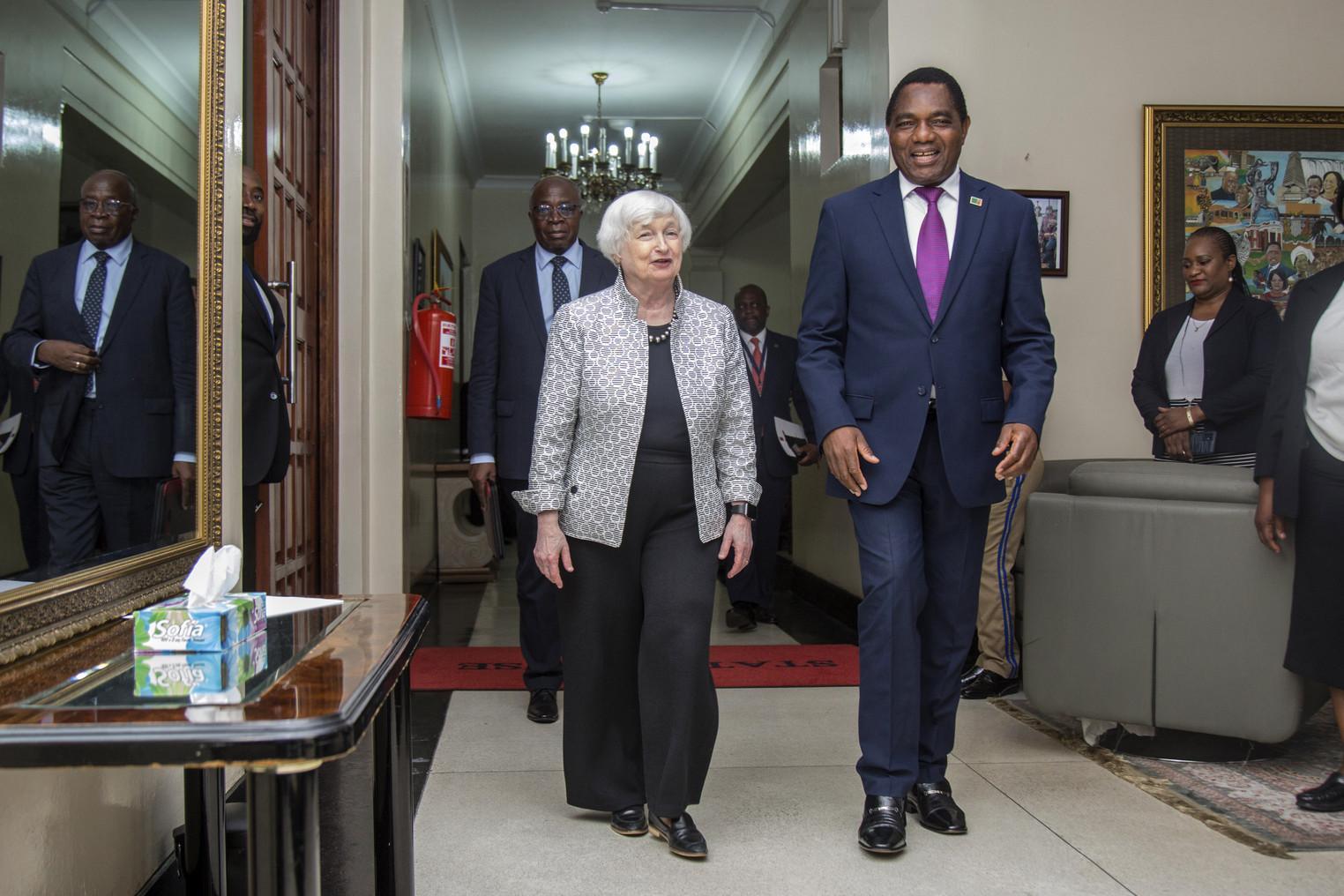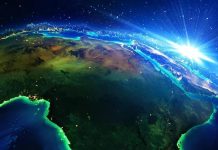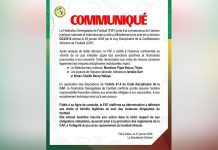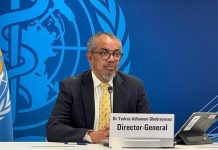By PHELIM KINE
Africa-Press – Mauritius. Hi, China Watchers. This week we unpack the Biden administration’s flurry of China-countering Africa diplomacy and canvass the priorities of newly appointed GOP members of the House Select Committee on China.
And in the spirit of the Chinese government’s diplomatic charm offensive, we profile a book that examines Beijing’s spotty success record with global influence campaigns. Let’s get to it. — Phelim Beijing no longer owns early New Year high level diplomatic engagement with Africa.
Hot on the heels of Chinese Foreign Minister QIN GANG’s Jan. 9-16 trip to Gabon, Ethiopia, Benin, Egypt and Angola, the Biden administration has launched a flurry of outreach with African countries — an apparent bid to push back against Beijing’s rising influence in the region.
The administration is playing catch-up — Qin’s trip marked the 33rd year that China’s foreign minister has made Africa his first foreign destination of the year. Treasury Secretary JANET YELLEN kicked off a 12-day swing through Senegal, Zambia and South Africa on Jan. 17. U. S.
Trade Representative KATHERINE TAI met with South African Minister of Trade and Industry EBRAHIM PATEL on the sidelines of the World Economic Forum in Davos, Switzerland on Friday.
Secretary of State ANTONY BLINKEN called Ethiopia’s Prime Minister ABIY AHMED to discuss the implementation of the cessation of hostilities agreement in the country’s restive Tigray region on Saturday.
The next day LINDA THOMAS-GREENFIELD, the U. S. representative to the United Nations, announced she would visit Kenya, Mozambique and Ghana on Jan. 25-29 “to affirm and strengthen our partnerships” with former and current U.
N. Security Council members. “It’s supercharged . . . and it demonstrates that we’re serious,” said LOUIS MAZEL, former director of the State Department’s Africa Bureau’s Office of Regional and Security Affairs.
That intensity of U. S. diplomatic outreach to Africa marks President JOE BIDEN’s resolve to follow through on his declaration last month at the U. S-African Leaders’ summit that he “is all in on Africa and all in with Africa.
” It also highlights his administration’s implicit challenge to China’s economic and diplomatic primacy on the continent.
“The number of high-level U. S.
officials now all of a sudden going to Africa is pretty well unprecedented,” said TIBOR NAGY, former assistant secretary of State for African Affairs.
“And say it or not, of course this is about China.
” Yellen has made China’s lending practices in Africa a key talking point. She made an implicit dig at Chinese debt trap diplomacy in a speech in Dakar, Senegal on Friday.
“The international community, including China, needs to provide meaningful debt relief to help [African] countries regain their footing,” Yellen said.
Yellen took another swing at Beijing on Monday in Zambia by urging private sector and bilateral lenders “to meaningfully participate in debt relief for Zambia, especially China.
” The Chinese embassy retaliated with a blistering statement on Tuesday that accused the U. S. of “sabotaging other sovereign countries’ active efforts to solve their debt issues. ”
Yellen has proposed unspecified adjustments in multilateral development bank lending in Africa “to better tackle both traditional development needs and increasingly complex global challenges.
” But she and other senior administration officials will need to offer more than rhetoric to persuade African leaders to strengthen ties with the U. S.
“There’s got to be some substance coming out of these meetings — Africans are not dumb and if they see us just showing up and then nothing happening afterwards, they’ll get discouraged,” said DAVID SHINN, a former ambassador to Ethiopia with extensive diplomatic experience across Africa.
Economic sweeteners will be key. China is the number one trading partner of sub-Saharan African countries. They import Chinese goods ranging from textiles to smartphones, and China purchases massive volumes of African agricultural products and commodities including copper and oil.
Beijing has also disbursed billions in infrastructure lending and foreign aid across Africa over the past two decades. Big ticket economic incentives for African countries to deepen their relationship with the U.
S. may emerge during upcoming trips to the continent later this year by other senior administration officials. Commerce Secretary GINA RAIMONDO announced last month that she will visit Africa this year “joined by leading American companies and investors.
” Biden has also pledged to come to Africa in 2023.
Africa watchers are monitoring if Biden dispatches a senior administration official to attend next month’s African Union heads of state meeting in Addis Ababa, Ethiopia.
“It would be great if someone like Secretary Blinken attended the AU summit — it would really underscore our commitment to pay more attention to Africa,” said Mazel, the former State official.
New China Select Committee GOP Members Sound Off House Speaker KEVIN MCCARTHY on Monday published the list of the 12 GOP members of the new House Select Committee on the Strategic Competition between the U.
S. and the Chinese Communist Party who’ll work under committee chair Rep. MIKE GALLAGHER (R-Wis. ). China Watcher canvassed that lucky dozen on their priorities and their responses are below.
Spoiler alert — the mood is hawkish. I’ll do likewise with the committee’s Democratic members once House Minority Leader HAKEEM JEFFRIES announces them. Responses have been edited for length and clarity. Rep. CARLOS GIMENEZ (R-Fla. )
Communist China steals our technological achievements, spies on America, threatens our allies and cheats the global economy with its blatantly unethical tactics.
The 21st century will be defined by the United States’ ability to effectively combat Communist China and its proxies. Congress must innovate quickly and powerfully to put the brakes on the CCP’s nefarious, dangerous worldview. Rep. DARIN LAHOOD (R-Ill. )
I intend to work with members on both sides of the aisle to bolster and secure our supply chains, promote our trade interests and leadership in the Indo-Pacific, prioritize our technology modernization, and protect our national and cyber security against China.
Rep. ROB WITTMAN (R-Va. ) I am particularly focused on the efforts we must take to build resilient supply chains to support our national security. We must secure our economy from the Chinese Communist Party’s coercive activities and maintain our military advantage for decades to come.
Rep. DAN NEWHOUSE (R-Wash. ) The United States is engaged in a great power struggle with the CCP, and we must respond with tough policies that will protect our farmland.
I will continue leading the charge. . . to ensure our agriculture industry and food supply chain is protected from any and all attacks, overt or otherwise. Rep. BLAINE LUETEKEMEYER (R-Mo. )
The CCP has a stated goal of overtaking the United States as the world’s superpower, and it has proven willing to do anything — from IP theft to forced child labor — to achieve that goal.
My focus will be on the weaponization of China’s economy and its influence on ours. Rep. MICHELLE STEEL (R-Calif. ) I’ll hold the CCP accountable for their horrific violations of human rights, their theft of U. S. intellectual property and secure U. S. supply chains, and strengthen U. S. trade competitiveness. Rep. ANDY BARR (R-Ky. )
Our committee must confront American investors unwittingly fueling the rise of CCP military and surveillance companies, defend Taiwanese sovereignty, and combat the rampant theft of American intellectual property.
Rep. JIM BANKS (R-Ind. ) Rebuilding our Navy is one of my top priorities for countering China and developing the first compressive strategy for confronting Communist China in Congress.
Rep. JOHN MOOLENAAR (R-Mi. ) China is buying U. S. farmland, stealing inventions, jeopardizing the health of every person in the world, and building up its military while threatening its neighbors.
I look forward to working with my colleagues to address all of these issues, as well as our nation’s supply chain concerns. Rep. DUSTY JOHNSON (R-S. D.) We need to address the threats posed by China to our food security and national security. Rep. NEAL DUNN (R-Fla. ) China is a foreign agitator and a serious threat to the United States and our allies.
Over-reliance on imported medical supplies from China compromises national security, the stability of our healthcare system and the security of our nation overall.
CHINA TURNS ON THE CHARM Chinese diplomats are fanning out with a new softer message for international partners and adversaries alike. Gone is the aggressive “wolf warrior” rhetoric.
In its place, a warmer tone and a promise of economic cooperation. That’s included Foreign Minister QIN GANG beaming into the Washington Wizards-Orlando Magic game via video on Saturday to offer Lunar New Year greeting s to the crowd.
It gets better: “Chinese zodiac rabbits were tossed to the audience and triggered a ‘scramble,’” Chinese embassy spokesperson LIU PENGYU tweeted on Sunday.
But there are suspicions that the engagement drive is more diplomatic sparkle than a shift in Beijing’s policy settings. Read the full story here here from me, POLITICO Europe’s STUART LAU and MATT KAMINSKI.
TRANSLATING WASHINGTON —BIDEN EXTENDS HONG KONGERS’ DEPORTATION PROTECTION: The Biden administration today extended a program that protects Hong Kong residents in the U. S. from deportation.
That will allow Hong Kongers facing potential deportation due to the looming Feb. 5 expiry of the Deferred Enforced Departure for Certain Hong Kong Citizens to remain in the U.
S. until Jan. 26, 2025. The White House has also expanded the number of people who may benefit from DED by making any Hong Kong residents present in the U.
S. today, Jan. 26, eligible to apply for the program. Hong Kongers in the U. S. “can breathe a sigh of relief,” said Samuel Chu, president of the nonprofit The Campaign for Hong Kong.
Read my full story here. —TRONE PUSHES BLINKEN ON CHINESE OPIOIDS: Rep. DAVID TRONE (D-Md. ) wants Secretary of State ANTONY BLINKEN to make the issue of China’s role in the U. S. opioid crisis a top priority in his Feb. 5-6 meetings in Beijing.
Synthetic opioids derived from chemical precursors “manufactured in the PRC, then shipped to Mexico where they are synthesized and then trafficked into the United States” are killing Americans, Trone, co-chair of Biden’s Commission on Combating Synthetic Opioid Trafficking, said in a letter to Blinken on Monday.
Trone urged Blinken to push for rules requiring Chinese chemical firms to identify buyers of precursor chemicals and adopt strict labeling requirements. He also wants Beijing to resume cooperation with the U. S. Drug Enforcement Agency.
China suspended high-level bilateral contacts for counternarcotics cooperation in August in reprisal for then-House Speaker Nancy Pelosi’s trip to Taiwan.
EU CHALLENGES BEIJING’S BELT AND ROAD: The European Union has lined up 70 international infrastructure development projects — ranging from a hydroelectric plant to a digital cable under the Black Sea — to compete with China’s Belt and Road Initiative.
Those plans are part of the EU’s new Global Gateway program which aims to mobilize more than $300 billion in public and private funds by 2027 to finance EU infrastructure projects abroad, as POLITICO’s BARBARA MOENS reported on Monday.
MUSLIM SCHOLAR JUNKET DRAWS FIRE: The Chinese government hosted a 30-member delegation of Muslim scholars from countries including Egypt, Indonesia and Saudi Arabia on a tour of Xinjiang earlier this month.
Their aim: mitigate international dismay about human rights abuses in the region by wooing visitors in hopes they’ll parrot the Chinese government’s talking points.
Chinese Foreign Ministry spokesperson WANG WENBIN said the trip proved that allegations of genocide against Uyghur Muslims were a “distortion of facts.
A Chinese state media report tweeted by Liu at the Chinese embassy includes soundbites from junket participants decrying foreign “bias” against China and praising preservation of Xinjiang’s “ethnic culture.
” Xinjiang experts are unimpressed.
“This is a desperate attempt by the Chinese to change the narrative, create a softer image in Muslim societies and project a more lovable image around the world,” said NURY TURKEL, a Uyghur-American lawyer and chair of the U. S. Commission on International Religious Freedom.
Beijing’s Xinjiang junkets (they’ve done similar ones previously) also distract from how foreign companies benefit from — and help sustain — Xinjiang’s abusive status quo, said JAMES MILLWARD, a Xinjiang expert and professor of inter-societal history at Georgetown University’s Walsh School of Foreign Service.
“There are many international corporations desperately trying to look the other way hoping to keep supplying cotton or polysilicon, or building automobiles in the Uyghur region, or importing goods into the U.
S. that could well be made with Uyghur forced labor,” Millward said. Beijing “doesn’t parade these corporations before the cameras. . . but their continued support for PRC policies is more influential than that of a few debtor nations in Afro-Eurasia.
—CHINA’S COVID CONFIDENCE GAME: Chinese state media is touting an early end to the country’s Covid surge.
That sharp rise in infections followed Beijing’s abandonment of its zero-Covid policy last month sparking reports of a spiraling death toll, crematoriums overwhelmed with corpses and a stressed health care system.
But Beijing says those dark days are over. State media reported last week that “the number of severe Covid-19 cases in China has peaked. ” WU ZUNYOU, chief epidemiologist at China’s Centers for Disease Control, said in a post on the Chinese social media platform Weibo on Saturday that a second wave anytime soon is highly unlikely.
Chinese paramount leader XI JINPING is declaring victory. “We have put people and their lives first. . . we can see the light at the end of the tunnel,” Xi said in his Lunar New Year message on Friday.
That confidence ignores that the virus has traveled from the cities with the millions of Chinese who have returned to their rural area homes for the current Lunar New Year holiday.
That has exposed a vulnerable and largely unvaccinated elderly population to infection. “I think they’re acting like the [viral] dam has been broken and now it’s been drained, but that’s not how this is going to work.
we could have additional rebound infections in these communities where not everyone got infected,” said MICHAEL OSTERHOLM, director of the Center for Infectious Disease Research and Policy at the University of Minnesota.
Beijing’s recent efforts to vaccinate elderly people reaped World Health Organization praise last week, but comes too late to affect the current outbreak.
Such applause is akin to Beijing “being acknowledged for putting on their seatbelt after the accident,” Osterholm said. HEADLINES The Pie News: Chinese students signing ‘loyalty’ pledges before arrival in Sweden
CNN: “If war breaks out . . . I will just become cannon fodder”: In Taiwan, ex-conscripts feel unprepared for potential China conflict Financial Times: Red Memory – enforced forgetting and the legacy of the Cultural Revolution HEADS UP
—TASS TOUTS RUSSIA-CHINA NAVAL DRILLS: The Russian state news agency TASS reported Monday that Russian, Chinese and South African naval vessels will hold joint drills in the Indian Ocean Feb. 17-27.
They’ll focus on “sharing operational skills and knowledge,” TASS reported, citing an anonymous “military-diplomatic source. ” The U. S. is “concerned” about the drills, DAVID FELDMAN, spokesperson for the U.
S. Embassy in South Africa, told CBS News on Wednesday. This will be the third major Russian-Chinese joint military drill since November. Those exercises included a strategic bomber patrol over the East China Sea in November and naval exercises in the East China Sea last month.
“I do not see a notable or sharp increase in China-Russia exercises, but a steady increase over the past few years,” said M. TAYLOR FRAVEL, director of the Security Studies Program at the Massachusetts Institute of Technology. The joint drills “are more about signaling their political alignment and influence than increasing joint operational capability, at least for now.”
https://www.politico.com/newsletters/politico-china-watcher/2023/01/26/bidens-supercharged-african-diplomacy-00079578
For More News And Analysis About Mauritius Follow Africa-Press







